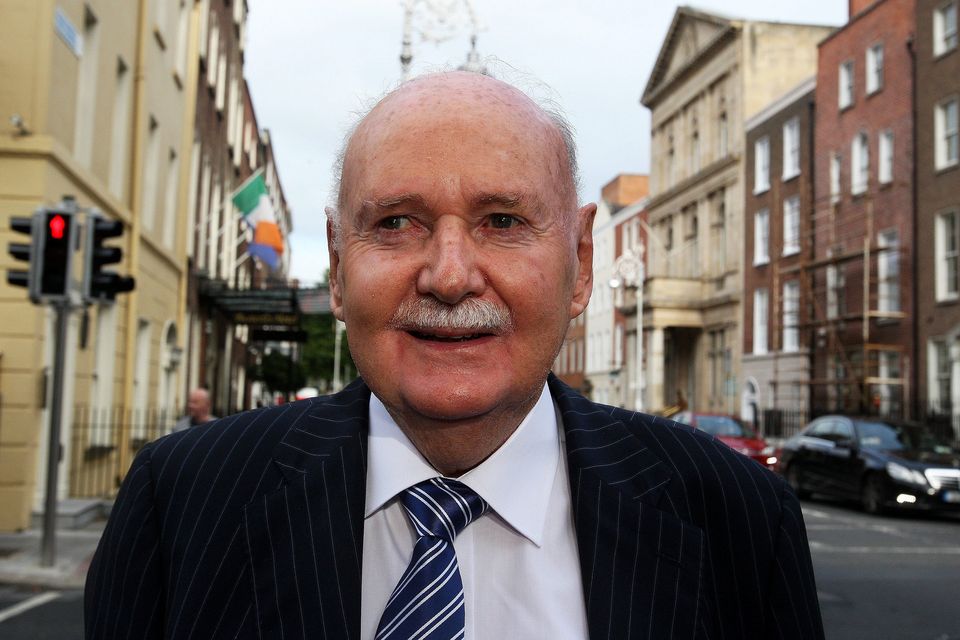Business
Judge Deliberates After Prolonged Michael Fingleton Case

A lengthy civil case involving former banker Michael Fingleton has concluded at the High Court, where the judge has reserved judgment. Fingleton, who managed the Irish Nationwide Building Society (INBS) from 1971 to 2009, faces allegations of negligent mismanagement that contributed to the institution’s collapse following the financial crisis.
At its peak in 2007, INBS reported assets of €16 billion. However, just a year later, it became a victim of the crisis, leading to substantial losses. The Irish Banking Resolution Corporation (IBRC) claims that INBS incurred losses estimated at €6 billion due to Fingleton’s decisions regarding five specific loans. The IBRC is seeking approximately €250 million in damages linked to these loans.
Fingleton, now aged 87 and suffering from ill health, did not testify during the proceedings. His case has faced multiple challenges and appeals from his family, including his wife, Eileen Fingleton, and son, Michael Fingleton Jr., who acted under powers of attorney. Those attempts to halt the proceedings, initiated in 2012, ultimately proved unsuccessful.
Allegations of Mismanagement
The closing submissions from the plaintiff’s side, represented by barrister Lyndon MacCann SC, emphasized that INBS operated under a misguided belief that property values would continuously rise. MacCann stated that there was a “blasé” attitude towards warnings from auditors and the financial regulator, arguing that Fingleton’s leadership resulted in “profound mismanagement” over nearly four decades.
The five loans in question were associated with property projects in Ireland, France, and the UK between 2006 and 2008. MacCann accused Fingleton of “gambling” with the society’s funds by approving speculative loans, sometimes without necessary board oversight.
In contrast, the defense, led by solicitor Niall Clerkin, contended that significant gaps in evidence existed. Clerkin noted that “large substantial tracts of documents” were missing and that several key witnesses had not been called to testify. This, he argued, created an “unfairness” that compromised the Fingleton family’s ability to mount a robust defense.
Background and Financial Context
The trial began on May 6 and involved 41 days of evidence and submissions, with the court reviewing around 1.6 million documents. The Fingleton family was represented by solicitors from Clerkin Lynch LLP, while the IBRC’s legal team included senior counsels from McCann Fitzgerald Solicitors.
The case holds significant implications, considering the fate of INBS following its merger with Anglo Irish Bank in 2011 to form the IBRC. Once a prominent business figure during the Celtic Tiger era, Fingleton was estimated to be worth around €75 million in 2006. In stark contrast, court documents reveal that his current wealth is merely €25,000 across two personal bank accounts, coupled with outstanding judgment debts exceeding €10.7 million.
The judge’s reserved judgment marks a critical moment in a case that has drawn attention to the broader issues of financial governance and accountability in the wake of one of Ireland’s most significant economic crises. The outcome will likely have lasting effects on the perceptions of leadership within financial institutions and the consequences of mismanagement.
-

 Top Stories3 months ago
Top Stories3 months agoTributes Surge for 9-Year-Old Leon Briody After Cancer Battle
-

 Entertainment4 months ago
Entertainment4 months agoAimee Osbourne Joins Family for Emotional Tribute to Ozzy
-

 Politics4 months ago
Politics4 months agoDanny Healy-Rae Considers Complaint After Altercation with Garda
-

 Top Stories4 months ago
Top Stories4 months agoIreland Enjoys Summer Heat as Hurricane Erin Approaches Atlantic
-

 World5 months ago
World5 months agoHawaii Commemorates 80 Years Since Hiroshima Bombing with Ceremony
-

 Top Stories3 months ago
Top Stories3 months agoNewcastle West Woman Patricia Foley Found Safe After Urgent Search
-

 Top Stories5 months ago
Top Stories5 months agoFianna Fáil TDs Urgently Consider Maire Geoghegan-Quinn for Presidency
-

 World5 months ago
World5 months agoCouple Convicted of Murdering Two-Year-Old Grandson in Wales
-

 World5 months ago
World5 months agoGaza Aid Distribution Tragedy: 20 Killed Amid Ongoing Violence
-

 World5 months ago
World5 months agoAristocrat Constance Marten and Partner Convicted of Infant Murder
-

 Top Stories4 months ago
Top Stories4 months agoClimbing Errigal: A Must-Do Summer Adventure in Donegal
-

 Top Stories4 months ago
Top Stories4 months agoHike Donegal’s Errigal Mountain NOW for Unforgettable Summer Views









